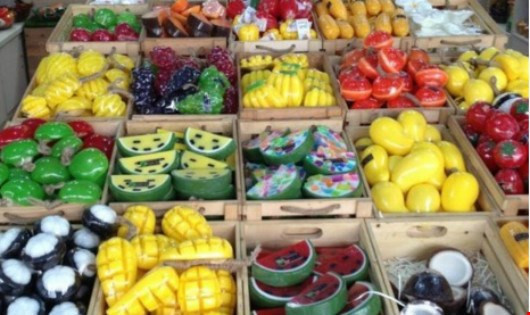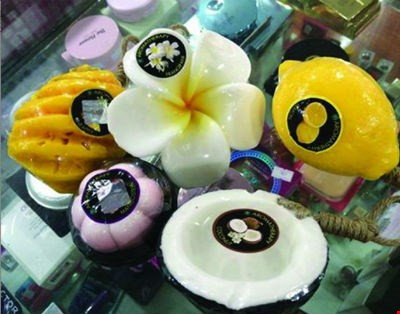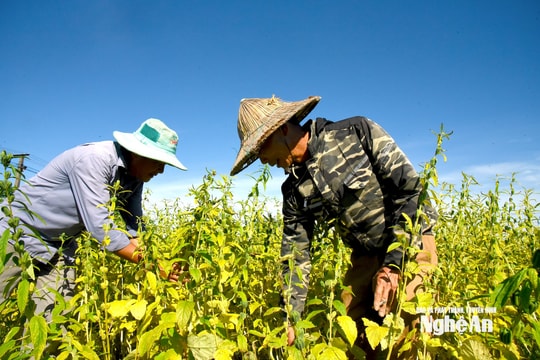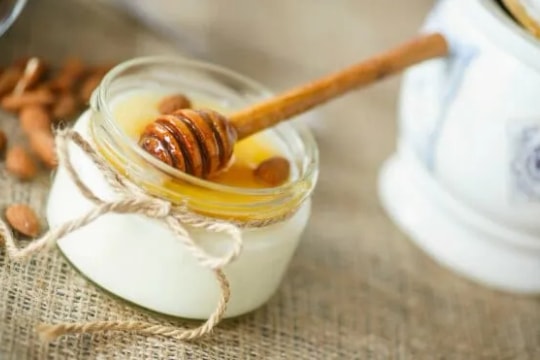Beware of cheap Thai soaps
Recently, on all online forums, many women have been whispering to each other about using Thai soaps in various fruit shapes with many different names such as: Natural soap, scented wax for whitening skin, handmade soap for skin care... It is worth mentioning that these products are rumored to be 100% natural fruit soaps, safe for consumers, so they sell very well.
 |
| While in Thailand, natural soaps are covered to preserve their color and quality, in Vietnam they are sold right under the sun. |
Fruit soap helps whiten skin (?!)
Advertising a soap made from rice bran, a store manager said: “Normally people only use soap to wash their hands, but this Thai product made from rice bran, goat milk, etc. is extracted 100% from natural ingredients. Thai handmade soap is being sought after by many Thai and Asian women. Committed to reducing blemishes and dark spots on the face and body; clearly feeling the soft, radiant skin with the natural scent of rice.”
According to this person, after using the above product just a few times, women's skin will become as white and bright as if they had gone to a spa. Moreover, due to its reasonable price, many people have rushed to buy this product, causing the current market to not have enough supply to meet demand.
It is worth mentioning that the selling price of natural soaps in many places varies significantly. Many Facebook pages are also selling fruit products with the "label" of "natural, handmade, herbal" soap, with different prices, ranging from 35,000 - 95,000 VND/bar. "Higher-end" soaps include ginseng, mulberry, noni, goat milk... priced at 200,000 - 600,000 VND/bar, made in Korea. However, in the market, many Thai consumer stores offer prices of 10,000 - 14,000 VND/bar.
In addition, the packaging of this “cheap” handmade Thai soap does not have any Vietnamese annotations. Most Thai soap packaging is kept minimal, usually just a few illustrations on a thin piece of paper. The product does not include additional mandatory information such as ingredients, skin irritation index, expiration date, etc. (in accordance with regulations for beauty cosmetics).
Some types of packaging have a lot of printed text on the back, but all in Thai, so it is difficult for customers to understand. Meanwhile, according to regulations, officially imported goods from abroad must have a Vietnamese sub-label with full information about the name of the goods; address of the unit responsible for distributing the product, origin of the goods, quantity, composition, quality indicators, date of manufacture, expiry date, instructions for use and preservation. If there is no Vietnamese sub-label and no invoice or document proving the origin, it is considered smuggled goods. With such obscure packaging, it is difficult for consumers to distinguish between genuine and fake goods on the market.
 |
| Information is sketchy, sometimes all in Thai without any Vietnamese sub-labels. |
It is difficult to distinguish between real and fake.
Ms. Luu Ly Ngoc Huyen (Hang Dao, Hanoi), who specializes in selling Thai hand-carried goods, said: "Currently, there are many fake Thai soaps on the market. They look quite similar but their quality is different. Only the way they are used can distinguish between real and fake. There are soaps that trick customers with very realistic fruit images, but inside there is no fruit at all, only the scent of industrial fruits, also called Thai handmade soap. Hanging this product outdoors without the need for a plastic wrap, the scent is still durable and the longer it is left, the drier and harder it becomes.
It is known that, in fact, Thai soap should never be left “naked” but always wrapped in a layer of plastic because the smell of food and essential oils will decrease when exposed to sunlight and wind. This type of soap is very soft to the touch because it is soaked with glyceryl surrounding the soap bar. But anyway, you should not wash your face with this type of soap.
Normally, users always avoid using bath soap and shower gel to wash their face because they are worried that the amount of lye in the product will have a negative impact on the facial skin. With this line of whitening bath soap, it is emphasized: "Can be used to wash the face and is completely gentle on even the most sensitive skin areas". To make quick profits, many businesses do not hesitate to exaggerate, even though they do not fully understand the quality and uses of the product. Consumers should not believe too much in these "winged" advertisements on social networks or they will "lose money and get sick".
Pharmacist Nguyen Ba Huy Cuong (Murdoch University of Pharmacy, Australia) also warned in a study on bath soap: “It is very rare to find soap made from 100% natural ingredients. Because if the product is from nature, the color will fade very quickly while the industrial color on these soaps is quite durable. Most of the fragrances in soaps are synthetic fragrances, some soaps may contain added dyes. All of these chemicals can cause skin irritation, skin allergies, skin itching, dermatitis, even eczema and psoriasis... over time. More dangerously, they can penetrate the skin, enter the blood circulation and cause damage to other internal organs in the body through many different mechanisms.”
According to Vietnamese Law
| RELATED NEWS |
|---|

.jpg)




.jpg)

